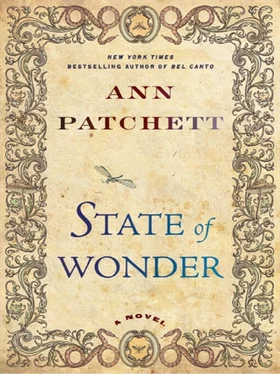Dr. Swenson nodded. She watched the boy watch the river. “Easter cries out in his sleep. It’s the only time I’ve heard his voice, but he has one. Months go by and I don’t hear him, but since Dr. Eckman died he’s had nightmares every night. It’s a terrible sound he makes.” Dr. Swenson turned then and let her eyes stay on Marina’s. “It’s a shame you can’t talk to him about it. It’s something that the two of you have in common. I will assume that the issue for you is mefloquine and that Mr. Fox did not send me a doctor with a debilitating mental illness.”
“I’m taking Lariam.” She wished she could bring back the box of grapefruit juice for Karen. It was, all things considered, a remarkable achievement.
“I’ve seen my share of screamers down here but when it happens I never think of Lariam. In the moment I always think it’s a snake.”
“Better to be safe.”
Dr. Swenson nodded. “Lariam is for tourists, Dr. Singh. I sincerely hope you are a tourist, out of here in the next canoe. But short of that I suggest you throw those pills in the river. Do you think I take Lariam? A person can’t live here having screaming nightmares and paranoia and suicidal fantasies. The jungle is hard enough without that.”
“I haven’t been suicidal.”
“Well, good for you. It can still come. I knew a young man who walked into the river one night and didn’t walk out. The natives saw him, thought he was going for a swim.”
“I don’t take it because I enjoy it, believe me.”
“Ever more the reason not to take it. It affects certain people quite seriously. I would say given this display that you’re one of them.”
Marina drew a slow breath in, held it, let it out. She could feel herself coming back even as the fire was raised in her arm. “All the same though, I’d rather not get malaria.”
“Well, I wouldn’t say it’s rampant. I haven’t gotten it, or I got it once but it wasn’t here. And there is after all a cure.”
“Was Anders taking Lariam?”
Dr. Swenson put her hands in her hair and gave her scalp an aggressive scratch. “He didn’t scream in his sleep so we never had the opportunity to discuss it. Are you asking me if Dr. Eckman died of malaria?”
It hadn’t been what she was asking, though it was a perfectly reasonable question. “It seems possible.”
“Malaria is something of a specialty of mine,” Dr. Swenson said. “So I can tell you no. Not unless it was P. falciparum that turned cerebral. That would be a true rarity, of course, there isn’t a great deal of P. falciparum in these parts.”
P. falciparum, P. vivax, P. malariae , and there was one more. When was the last time Marina needed to know the strains of malaria?
“ P. ovale ,” Dr. Swenson said.
“You think he might have had P. ovale ?”
“No, that’s the one you can’t remember. Mention a strain of malaria to any doctor and they try to remember the other three, but no one remembers P. ovale . You see very little of it outside West Africa. Do you have the same dream every time?”
Marina had been too recently asleep to understand everything, too recently on this boat, too recently discussing snakes, too recently in Calcutta, too recently with Anders. P. ovale ? “More or less.”
“I find mefloquine interesting in that way, how it taps into a single pocket of the subconscious. You could just as easily use it as a treatment as you could a preventative medicine. There’s no sense suffering in advance. It wouldn’t do you much good with cerebral malaria but as I said, that would be an extremely rare presentation in Brazil. What are your dreams about, Dr. Singh?”
What are your dreams about? her mother asked her when she was a child screaming in her bed. What did you dream? Mr. Fox asked, his hands holding the tops of her arms. “My father,” Marina said. “I’m with my father and then we’re separated somehow. I can’t find him.”
Dr. Swenson stood up with some difficulty. The interview had reached its conclusion. “Well, that doesn’t sound too bad.”
Marina would concede the point. When presented as a single sentence without embellishment it didn’t sound bad at all.
At dusk the insects came down in a storm, the hard-shelled and soft-sided, the biting and stinging, the chirping and buzzing and droning, every last one unfolded its paper wings and flew with unimaginable velocity into the eyes and mouths and noses of the only three humans they could find. Easter slipped back inside his shirt while Dr. Swenson and Marina wrapped their heads like Bedouins in a storm. When it was fully dark only the misguided insects pelted themselves into the people on board while the rest chose to end their lives against the two bright, hot lights on either side of the boat. The night was filled with the relentless ping of their bodies hitting the glass.
“Dr. Rapp used to say how easy it was for the entomologists,” Dr. Swenson said, turning her back to the onslaught. “They only had to switch on a light and all their specimens came running.”
Marina was less comfortable in the jungle now that she couldn’t see it. She felt the plant life pressing against the edges of the water, straining towards them, every root and tendril reaching. “Not only do the specimens come to you, they then have the decency to kill themselves.”
“This is worse than a hailstorm,” Dr. Swenson said, spitting a small winged beetle onto the deck. “We can do without the lights.” And then she turned off the lights.
In an instant the veil of insects lifted and Marina saw nothing as she had never seen nothing before. It was as if God Himself had turned out the lights, every last one, and left them in the gaping darkness of His abandonment. “Shouldn’t Easter be able to see where he’s going?” she asked. She could barely hear the sound of her own voice over the engine. A boy who could find a single branch in a thousand miles of uninterrupted trees could surely find his way home in the dark. She was the one who wanted the lights back on.
“Open your eyes, Dr. Singh,” Dr. Swenson said. “Look at the stars.”
Marina put her hands out in front of her and batted at the air until she found the rope at the edge of the boat. She held tightly to it when she leaned to the side. Beyond the spectrum of darkness she saw the bright stars scattered across the table of the night sky and felt as if she had never seen such things as stars before. She did not know enough numbers to count them, and even if she did, the stars could not be separated one from the other, the whole was so much greater than the sum of its parts. She saw the textbook of constellations, the heroes of mythology posing on fields of ink. She could see the milkiness in everything now, the way the sky was spread over with light. And when, finally, she could tear herself away from the theater above them to look forward again she saw yet another light blinking like a mirage on the horizon. It was small and orange and as they came towards it, the light appeared to stretch into a single line, and when she thought she had the line fixed in her vision it broke apart. It scattered and spread, bits of it popping on and off. “There’s something up there,” she said to Dr. Swenson, and in another minute she said, “It’s fire.” What she meant to say was Turn the boat around.
“Indeed,” Dr. Swenson said.
It was a dozen fires, and then the fires tripled, and then Marina could no longer count them. What had been a line had spread into layers, and in those layers the circles of light lifted and fell. Was the fire in the tops of trees? Was it somehow burning in the water? Easter turned the lights of the boat back on and instantly the fire began to leap. A ululation of voices exploded the night, the ringing sound of countless tongues hitting the roofs of countless mouths. It filled the entire jungle and poured up the river in a wave.
Читать дальше












